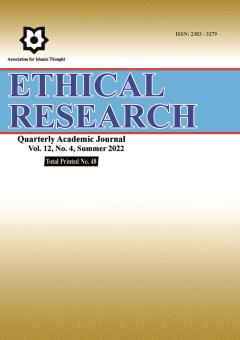-
-
List of Articles
-
Open Access Article
1 - nvestigating the Relationship between Religious Beliefs and the Use of Social Networks on Commitment to Islamic Hijab (Case Study: Students of Mohaghegh Ardabili University)
Ali Ahmadpour ALI rezaei sharif -
Open Access Article
2 - Effective moral education characteristics in children's digital storytelling
Fatemeh Etemadi fahimeh babalhavaeji seyd ali Hosseini almadani -
Open Access Article
3 - Civil liability and moral responsibility of governments in proportion to the exercise of their executive role
SEYEDAMIR ALEMOHAMMAD ali akbar gorji -
Open Access Article
4 - The Penalty of Apostates and the Quranic Verse Forbidding Compulsion in Islam (Conflict and Conformity)
Faranak Pousti Ahmad Bagheri -
Open Access Article
5 - Designing a model for improving human resource productivity with an ethical approach in the context of a resistance economy
iman hesami taklo Sirous Tadbiri maryam majidi alireza afsharnejhad -
Open Access Article
6 - Obstacles to the principle of the rule of will and the place of good morals in banking contracts
Ali Dizaji Behshid Arfania ali reza mazloom rahni -
Open Access Article
7 - Social factors affecting personality development from Rumi's point of view in Masnavi
Samad Abbaszadeh Gorjan Mohammad Farahmand Ebrahim Danesh Faramarz Jalalat -
Open Access Article
8 - Assumptions of professional ethics of university faculty members with emphasis on Islamic sources
AbdOlhamid Farzaneh -
Open Access Article
9 - Explaining the Relationship between Corruption and Tax Policy Implementation and the Role of Organizational Commitment (Yazd General Administration of Taxation)
Maryam Ali Omrani Alireza Manzari Tavakoli Sanjar Salajegheh -
Open Access Article
10 - Legal-Ethical Critique of the Stockholm School Theory in the Treatment of COVID-19 pandemic
Naser Ghasemi amir abbas rokni -
Open Access Article
11 - Examining the ethical principles of international commercial arbitrators
Samira Mohammadi Nejad Ali Gharibeh Hasan Pashazadeh -
Open Access Article
12 - Designing a model for creating a company's value set, taking into account the customer's ethical value and social ethical value
Keyvan Mohbed Hashem NikouMaram Karim Hamdi -
Open Access Article
13 - Ethical components of providing a model to motivate and increase the culture of buying domestic products (Case Study: Electrical Appliances)
Saloumeh Nouri seyed mahdi moafi madani Yadollah khodaverdi -
Open Access Article
14 - Designing a Model of Green Human Resource Management Excellence in Electric Power Distribution Companies of the North of Iran
mohsen yahyapoor mojtaba tabari asadollah mehrara mohammadreza baghrzadeh ezzatollah baloui jamkhaneh
-
The rights to this website are owned by the Raimag Press Management System.
Copyright © 2017-2026







